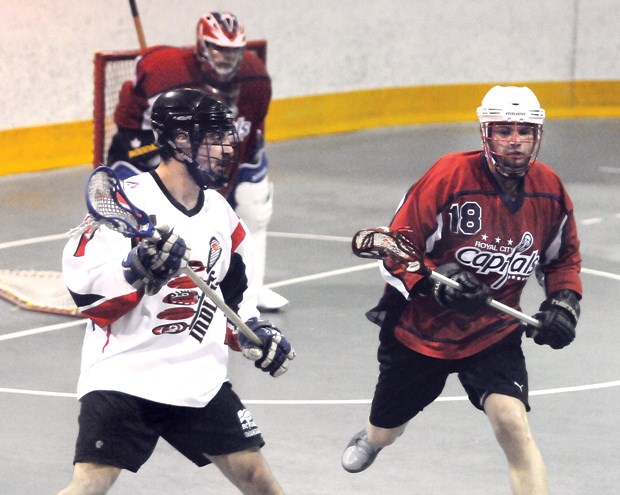Wayne C. Baker, the new head coach of the North Shore Indians senior B lacrosse team, wants players on his team who are in peak physical fitness, able to outrun and outgun their opponents for an entire game.
Baker knows, however, that fitness doesn't come easy. But he also knows from his own experience that it works. The North Vancouver native, a member of the Squamish Nation, has been a player or player-coach on four teams that went on to win the President's Cup, the trophy awarded to the Canadian Lacrosse Association's senior B national champion.
His first national title came as a player with the Indians in 1985. Baker credits the coach of that team with whipping the squad into shape by making them run a circuit before practices that included the steep hill on North Vancouver's 19th Street East.
"We called it puke hill. We'd run up that thing at least three or four times," said Baker. "Then we used to run into the arena and we'd have to do 10 stairs around the whole arena. Up and down, up and down, up and down. Then we'd go put our gear on and start playing. But that team was a good team because everybody was running."
The Indians won it all again with Baker as a playercoach in 1993. In 1999 Baker won his third cup as a member of the Burnaby Bandits. He'd had a falling out with the Indians, but Baker got the last laugh as the Bandits ended up playing the Indians in the national championship game.
"We played them in the national final and won. They were pissed," he said with a laugh. He reunited with the Indians in 2001 and again acted as a player-coach as the team went on to win their third, and his fourth, national title.
Baker hasn't been involved with the team in recent years but before this season he was asked to come back and coach and said yes on the condition that he could run the team the way he sees fit. That means he wants them fit, and he wants them all to play defence.
Baker learned a strong, inclusive defensive system - different from common lacrosse systems that have players specialize in just offence or defence - when he played with the senior A Vancouver Burrards in the early 1980s.
"We used the same defence every cup we won," he said. "Every time I got in there I always said, 'This is what we're learning first before anything else, this defence.' Of course, we know, defence wins championships."
The system worked well right off the bat this season as the Indians, playing their home games on Friday nights at West Vancouver Ice Arena, got off to a 4-1 start to jump to first place in the West Coast Senior Lacrosse Association. The wheels have fallen off since then, however, as the Indians lost their last seven games to drop into sixth place heading into last night's game in Langley against the Warriors.
"It started out really great, and then we hit a road bump," said Baker. "I find that it's a different game than when I used to play. The commitment from the players is not like when I was playing. We showed up for practice."
The Indians - a team made up mostly of players from the North Shore and Vancouver - will be back at home Friday for a matchup against Port Moody starting at 8 p.m. at West Vancouver Arena.
"I'm just trying to get this team together - trying to find players that want to play is the hard thing," said Baker. "We've got quite a young team. That's a good thing. They'll be ready to go next year. And if we keep them around for three years then we'll be ready for hosting the President's Cup and challenging for another cup."
Baker has a long and illustrious history with the club but the Indians go back much further than their coach.
The team was a phenomenon in the 1930s, drawing attention to the sport around the province. They played in the Mann Cup final in 1936 - equivalent to the senior A national championship - and lost 3-1 to the Orilla Terriers. Despite the loss, the team gained widespread fame and in 1999 was inducted into the B.C. Sports Hall of Fame. Many of today's players are direct descendants of those stars of a different generation.
"They're all cousins. Bakers, Josephs," said Baker. "There's a sense of pride. That's why we don't like losing."



